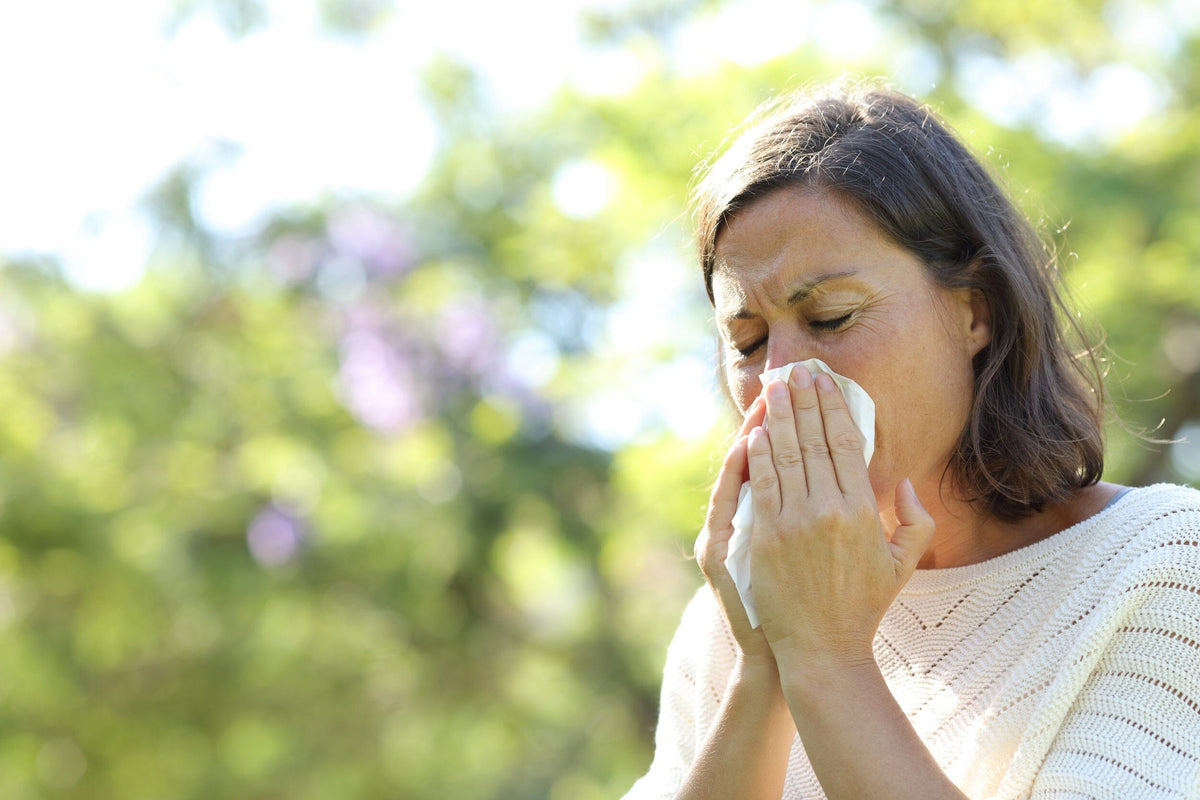The sniffling, sneezing, itching and watery eyes that accompany allergies are symptoms all-too-familiar to many people. In fact, more than 50 million people in the U.S. suffer from some type of allergies.1 For about 19 million, allergy symptoms appear seasonally in the form of hay fever.2
So, while you might expect your spring allergies to kick in right about now, what you might not expect is that they could be worse if you’re going through menopause. “Allergic diseases affect women disproportionally,” says Dr. Alyssa Dweck, Bonafide Chief Medical Officer. “While we don’t understand the exact mechanism causing this, it does seem that changes in estrogen—which occur both right before menstruation and throughout the menopause transition—can worsen allergy symptoms.”
What are Allergies?
When your body senses what it considers a foreign invader (like pet dander or pollen), your immune system revs up and overreacts. In order to fight off the allergen, it creates a type of antibody called immunoglobulin E (IgE). Your body’s IgE response triggers symptoms we commonly think of as an allergic response.3
Common types of allergies include both indoor allergens, like dust, mold and pet dander, as well outdoor pollens. You can also be allergic to different foods, medications, insect stings or latex.4
Some allergies cause a skin reaction—such as hives or eczema. Respiratory allergies are the kind that make you sniffle and sneeze. Asthma is also a type of allergic respiratory disease.
Can Hormones Affect Allergies?
When you think about symptoms typically associated with menopause, you probably think of hot flashes, moodiness, vaginal dryness and a loss of sex drive. But many women are surprised to find their allergies worsening (or developing for the first time) right around the time they experience menopause. You may be wondering; can you develop allergies during menopause?
“While it’s not a commonly recognized association, it does seem that changes in estrogen, which occur throughout the menopause transition, can worsen allergy symptoms, including runny nose and itchy eyes,” says Dr. Dweck.
One thing is clear, there’s a connection between hormones and allergies. Research has shown that there are estrogen receptors on the body’s immune-regulating cells. When estrogen binds to receptors on these cells, they release histamines (a chemical that causes allergic reactions).5,6 High or low estrogen levels can affect how these cells respond to an allergen.7 Estrogen can also affect inflammation in the airways, worsening allergy or asthma symptoms. In fact, women with asthma often find their symptoms increasing during menopause—and some may start noticing symptoms for the first time during this transition.8
Estrogen isn’t the only hormone responsible for potentially worsening allergy and asthma symptoms during menopause. “Progesterone typically counterbalances estrogen’s effect on the body’s allergic response,” explains Dr. Dweck. “But during perimenopause and menopause, progesterone levels are lower.”
How Can You Manage Allergies During Menopause?
Whether you’re experiencing allergies for the first-time during menopause or suffering from them more than you used to, there are many ways to help keep symptoms at bay.
Knowing what triggers your allergies—and avoiding those triggers whenever possible—is the best way to prevent allergy symptoms. For example, you can limit outdoor activities on days with high pollen counts or keep pets out of your bedroom.9 Using a HEPA air filter inside your home can also help eliminate some airborne allergens.10
Other allergy treatment options include:
- Nasal rinses: Using sterile saltwater or saline to rinse out your nasal passages can help clean out mucus and allergens to help you breathe easier.11
- Over-the-counter medications: OTC Antihistamine medications help by blocking the body’s release of histamines, the chemicals that trigger sniffling, sneezing and other allergies symptoms.12 You can also buy non-prescription nasal sprays or allergy eye drops to relieve nasal symptoms or itchy, watery eyes.
- Prescription allergy medications: If over-the-counter remedies don’t provide enough relief, your healthcare provider or allergist can prescribe stronger antihistamines or nasal corticosteroids.13
- Immunotherapy treatments: For people with severe allergies, shots or sublingual therapy (which involves being exposed to small amounts of allergens injected under the tongue) can help reduce sensitivity to a particular allergen.14
If your allergy symptoms are increasing or becoming hard to manage with non-prescription remedies, be sure to talk to your healthcare provider. They can help you find the relief you need to breathe easier—through menopause and beyond.
Resources
- https://www.aafa.org/allergy-facts/
- https://www.cdc.gov/nchs/fastats/allergies.htm
- https://www.aafa.org/allergies.aspx
- https://acaai.org/allergies/allergies-101/
- https://www.webmd.com/allergies/what-are-histamines
- https://pubmed.ncbi.nlm.nih.gov/23090385/
- https://www.ncbi.nlm.nih.gov/pmc/articles/PMC3537328/
- https://www.frontiersin.org/articles/10.3389/fimmu.2015.00568/full
- https://acaai.org/allergies/management-treatment/living-with-allergies/environmental-allergy-avoidance/
- https://acaai.org/allergies/management-treatment/living-with-allergies/air-filters/
- https://www.aaaai.org/tools-for-the-public/conditions-library/allergies/saline-sinus-rinse-recipe
- https://www.aafa.org/allergy-treatments/
- https://www.aafa.org/allergy-treatments/
- https://www.aafa.org/allergy-treatments/







